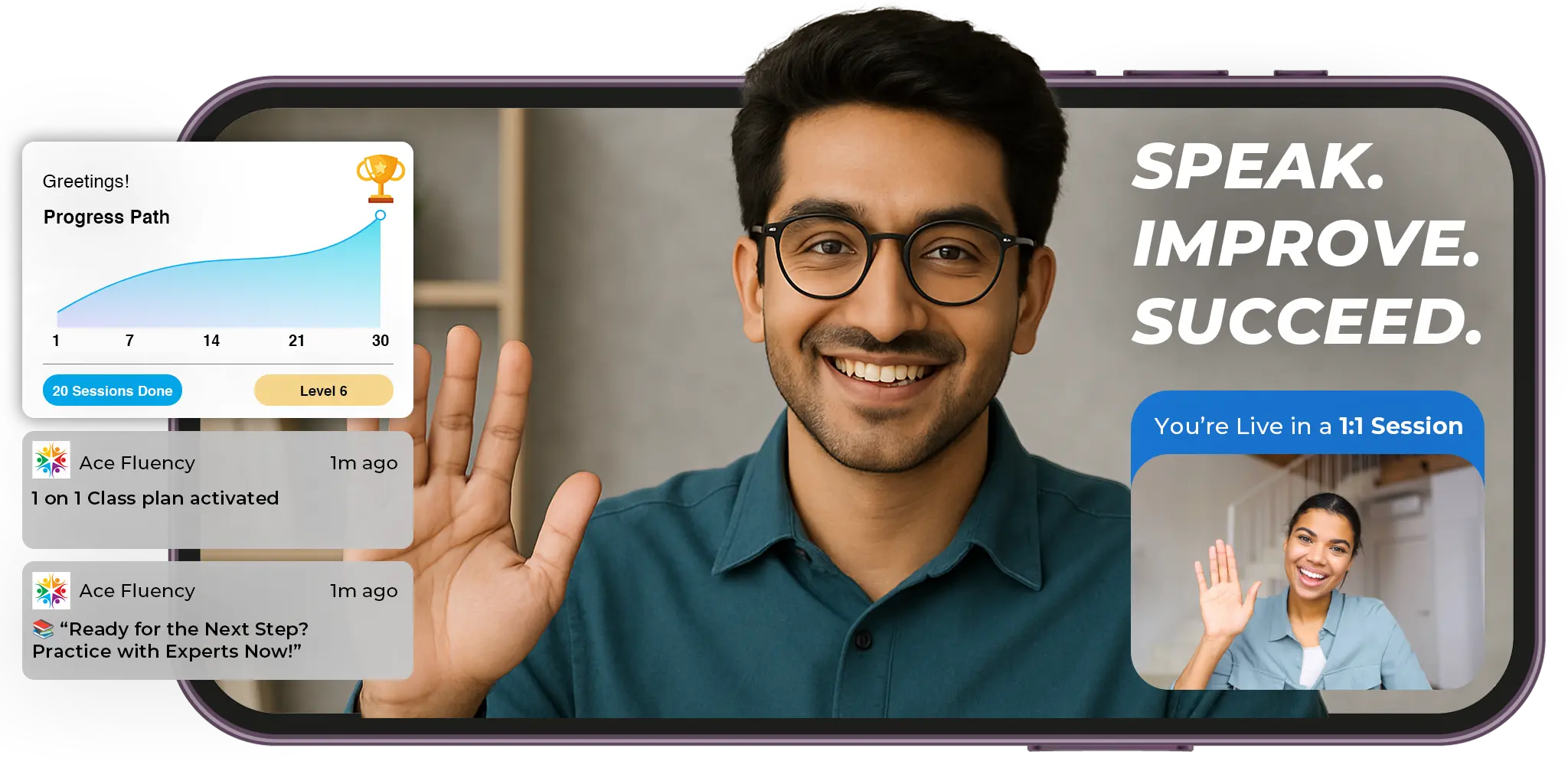Level up your career
with fluent English
1on1 Classes with expert Trainers

How It Works
Start your journey to English fluency in just 3 simple steps. Our proven process makes learning effective and enjoyable.
Book a Trial Session
Choose a tutor and a convenient time that works perfectly for you. Our flexible scheduling makes it easy to fit learning into your busy life.
Join the Live Session
Connect with your tutor for an interactive 1-on-1 video call. Experience personalized learning in a comfortable environment.
Get Personalised Feedback
Receive detailed feedback and personalized recommendations to work on your improvement areas and track your progress.
Our Learners Work At
Join professionals from top companies who have transformed their English communication skills with Ace Fluency






















Start Your English Journey
Whether you're just starting out or ready to take your English to the next level, we have the perfect plan for you.
Risk-Free Trial
Experience a 1-on-1 session and see the difference
- 30-minute live sessions
- Choose your preferred tutor
- Expert tutor matching
Subscription Plans
Choose from multiple duration plans with flexible options
- Multiple duration options
- 1-on-1 personalized sessions
- Access to all qualified tutors
Meet Our Friendly & Expert Tutors
Pick from 100+ certified tutors with diverse experience and proven track records.
What Our Learners Say
Join thousands of learners who have transformed their English fluency and achieved their career goals with our proven method.
“I was terrified of client calls. My manager would ask me to join calls with US clients and I'd make excuses. My tutor helped me practice explaining technical concepts step by step. Now I can confidently participate in client meetings and even got a good performance rating.”

“I used to sit silently in meetings even when I had good ideas. My accent made me self-conscious. My tutor taught me to speak slowly and clearly. Last week, I presented our monthly report to the team and my manager appreciated my clear communication.”

“I struggled with presenting my ideas to the team. My tutor helped me structure my thoughts and practice difficult questions. I recently presented our social media strategy to my manager and received positive feedback for my clear presentation.”

Improve 3x Faster Than Traditional Methods
Experience a revolutionary approach to English learning with our AI-powered platform that adapts to your pace and style.
Learn from experts
Choose your time
Schedule your session
Get into real conversation
Analyse progress report





Frequently Asked Questions
Find answers to common questions about our platform, services, and how to get the most out of your English learning journey.
Ace Fluency is a comprehensive platform for live, 1-on-1 English practice with expert tutors. We help learners improve their English speaking, listening, and communication skills through personalized sessions tailored to their specific needs and goals.
Booking a trial is simple! Click the 'Book a Trial' button, choose your preferred tutor from our expert lineup, select a convenient time slot, and confirm your payment.
Our subscription includes flexible scheduling, detailed progress reports, personalized learning plans and access to exclusive learning resources.
Absolutely! You can browse through our extensive tutor profiles, read their bios, check their specializations, and choose the tutor that best matches your learning goals and schedule preferences.
You just need a stable internet connection, a device with a camera and microphone (laptop, tablet, or smartphone), and a quiet environment. We recommend using Chrome or Safari browsers for the best experience.
Our standard sessions are 30 minutes long, which provides focused time for effective practice and feedback. This duration is ideal for maintaining engagement and consistent progress in your English fluency journey.
Yes! Group sessions are available on our mobile apps, allowing you to learn with peers in an interactive environment. On this website, we currently focus on 1-on-1 sessions to provide personalized attention and faster progress. Download our mobile app to access group learning sessions!
You can book your classes in advance based on your convenience. Cancellations are allowed up to 4 hours before the scheduled session.
We support all levels from beginner to advanced, including business English, academic English, and conversational English. Our tutors are trained to work with learners at any proficiency level.
